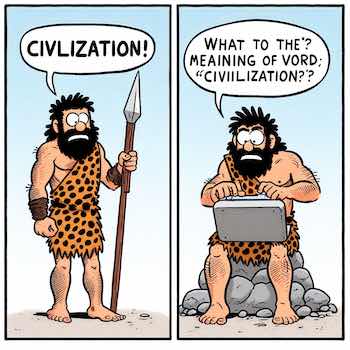Sommaire
The comments of the presidential word
“Decivilization”, Emmanuel Macron’s diagnosis of the recent riots, has been widely commented on. The general meaning of ‘civilizing’ is to soften mores, to encourage the self-discipline which allows the progress of living together. Martin Legros uses the double look – without knowing it – to separate two seemingly contradictory meanings of ‘civilization’, which he defines as ‘Greek’ and ‘Roman’. To be civilized in the Greek sense is to recognize the pre-eminence of the city over the citizens. To be civilized in the Roman sense is first to be a fellow citizen before being part of the city.
We find here the downward look, from the whole (the city) on its parts (the citizens), and the upward, from the parts towards the whole. They are analytical tools and neither can be chosen over the other, at the risk of missing an essential aspect of the relationship.
On the other hand, we generally prefer one of the looks when it better corresponds to the state of the conflict present inside us. If I am a preferential collectivist, I feel more ‘cited’ than ‘citizen’ and I favor the downward look. If I am a preferential individualist, it is the opposite. In the jargon of the T<>D conflict1(T<>D) is the core principle of the ‘Theory of Everything’ explained in Surimposium. Its simplicity is extreme: Everything emanates from a conflict between individuation and collectivization. Between “I am” and “belong to”. Between the T of soliTary and the D of soliDary., I am rather soliDary (D) or soliTary (T).
How do we want to be policed?
The D accepts the presence of a police force very well and even supports its excesses. He sees no denial of identity, since the City that sends its police is an important part of itself. The T, on the other hand, distrusts the police and quickly denounces their abuses. Their identity is strongly individualistic and sees any imposed rule as a threat.
If these two looks are equivalent in importance, then how do we define the fact of “civilizing” or “decivilizing” the relationship between city and citizens? The President speaks of “decivilization” when the City loses its authority, when it is contested by the citizens. A protester would like to use the same term because as a citizen she claims that her interests are no longer represented in the City.
Although their views are radically opposed, they finally agree! This makes it easier for us to unify the meaning of the word. “Decivilization” is a degraded relationship between citizens and City which gives an impression of loss of power to both. Whereas “civilization” is a strengthened relationship that increases the power of both citizens and the City.
The City, a power that regulates individual conflicts
But how is it possible to “civilize” when the interests of the Whole and the parts diverge? Is not the power given to one immediately lacking to the other? Not necessarily. It’s the whole point of understanding exactly how the T<>D conflict works. It can be a builder or a destroyer, it all depends on the organization it leads to.
First of all, let’s understand that the D always starts from the T. At the start, it was citizens who joined forces, who together built a city. The City is the organizational stability that connects them. It is essential, otherwise each inter-individual conflict would immediately destroy any agreement. But it can become suffocating if it is too conservative, to the point of no longer corresponding to the lives of citizens, whose fashions are constantly changing.
The City is metastable
The City is thus a metastable Whole: it lasts as long as the conditions are favorable to it and can collapse when the context has changed too much. The City is a continual alternation of constructions and deconstructions. Phases of civilizations and decivilizations. We still see the effects of this in the modern age. The City is decivilized, the President as much as the demonstrators are right. This does not in itself designate the culprits. Only the diagnosis is made: the relationship between (some) parts and the Whole is damaged.
Anarchy leads to tyranny
What is threatened is the current form of the City, as a collective regime. Having become a very deep hierarchy of laws, it never completely collapses. It loses levels of complexity, falls into temporary anarchy (the state favoring the Ts), and reforms a D with modified rules. Political metastability is a series of stable states separated by chaos. They do not follow each other randomly. The new state will likely become a more tyrannical City than before, as anarchy frightens both the elite and those who need solidarity to survive, which are a majority of citizens.
*

